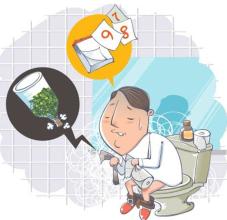Constipation in the elderly is more common due to various factors related to old-age. According to a study in by the American Family Physician, 26% of elderly men and 34% of elderly women are affected by constipation. Suffering from constipation can cause piles, rise in blood pressure, anal fissures, abdominal pain, and depression. Constipation can sometimes even lead to a stroke.
1) Causes of Constipation in the Elderly
Decreased physical activity: As age catches up with you, physical activity becomes minimal. This affects the digestive system and can lead to difficulty in passing stools.

Constipation
Eating and drinking smaller portions: Loss of appetite, depression, and exhaustion can be some of the reasons as to why senior citizens eat less food and drink fewer fluids. Eating lesser food decreases regular bowel movement, and reduced fluid intake leads to constipation.
Loss of muscle tone: Another factor that impacts the elderly is the loss of muscle tone due to aging. This will have an effect on both the sphincter muscle, which helps in the discharge of waste from the human body, and the intestinal muscles, which aid in the digestion of food.
Decreased ability to smell and taste: The ability to taste and smell food decreases with age, which is why a lot of elderly people lose interest in eating food, leading to loss of appetite and less food consumption, which, in turn, leads to constipation.
Prescribed medications for other ailments: As you get older, the number of health problems increase and constipation is sometimes one of the side effects of the medication for these problems.
Chronic constipation in the elderly is also linked to mental and emotional problems, which is why it is important to remain optimistic.
2) Preventive Measures and Treatment
Try to inculcate a regular morning habit of using the bathroom. If done regularly over a period of time, your body will get conditioned to defecate.
Include foods like spinach, corn, crude flour, leek, brown rice, celery and fruits that are rich in dietary fiber.
Drinking a warm glass of water or water with honey will also help to maintain bowel movements.
Stay optimistic and try to avoid stress, worry and negative feelings, as they can worsen the constipation.
Include some form of exercise into your daily routine to enjoy normal bowel movements.

![Diseases, Symptoms, tcm, [tcmwindow.com]](/uploadFile/adImg/2015/11/11/f5cbfcc0-4df5-4646-9b9a-f316651a0199.jpg)





